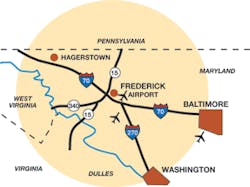FREDERICK, MD -- A visit to this historic colonial city, first chartered in 1745, brings with it the echoes of a Revolutionary era and of Civil War. It's the same with its airport, Frederick Municipal, which has a history as an active general aviation facility - augmented by the fact that this is home to the Aircraft Owners & Pilots Association. Much of this place smells of general aviation in the 1960s, which is why a master plan update is in the works. At the same time, the 'two Bills' of Frederick Aviation are investing money and sweat into upgrading service levels and putting the FBO on a new map, the one used by business aviation. Yet, they don't want to lose the GA culture that is so much a part of this field.
Two years ago, Frederick Aviation opened a $1.2 million terminal and corporate hangar upgrade, becoming an Exxon Avitat dealer to get on the map of corporate aviation. Located just 50 miles west/northwest of the Baltimore-Washington corridor, Frederick is a target for growth.
Bill Caudell, president of Frederick Aviation, says he's bullish about the future of aviation here, particularly with the company's charter department and with the prospects for corporate aviation growth.
"I think we have a real opportunity in the coming years to attract more and more transient corporate business," says Caudell. "The Baltimore-Washington market is a big market; we're in a good location. We just have to strive to get the convenience factor out. That's our real marketing thrust: getting the word out to corporate aviation that we are an alternative to BWI and Dulles - a convenient alternative, not to mention the differences between operating in and out of BWI or Dulles.
"Much of the business is not done in downtown [Washington], but to the north and toward Baltimore. I think anything on this side of the [Potomac] river is fair game."
That said, Caudell and partner Bill Greenwell are quick to stress that they do not want to lose the flavor of GA at Frederick Municipal.
Explains Caudell, "We would not exclude the GA and recreational flyer. That really is the background that got us here.
"But it's not a secret that the growth is going to come from corporate aviation, not the recreational flyers. We'll support them [GA] and provide the services."
Full-Service, Minus a Bit of History
Caudell, a former car dealer, got his start in the FBO business when he purchased Frederick Piper Sales in 1978, becoming a full-service FBO, including an active flight training business. Taking a historical approach to the business, both Caudell and Greenwell say they believe in the full services concept of running a fixed base operation - running counter to the current trend of providing line services and property management, with subtenants filling out the services menu.
Says Caudell, "We're still one of the old dinosaurs that tries to provide all the services people need.
"One of the big reasons is each one of our departments is a profit center. We do avionics because we make money doing avionics. We do charter because we make money doing charter. Same with maintenance. We're basically the only full-service FBO on the airport. We couldn't easily get out of it without leaving the customers on the airport without support.
"We want to make money but we also want to support the people on the airport; that's the bottom line."
Meanwhile, flight training, originally the key business in 1978, has since been sold off to an adjacent tenant who is a primary fuel customer. "We got out of it gracefully," explains Caudell. "We leased the building next door, did a renovation, and made it into a first-class facility. We moved our flight school into it as an independent company."
Awaiting the Update
Frederick Aviation officials say they are eager to expand on their new corporate direction, and anticipate the updated master plan will lead to the airport extending its 5,220-foot runway to 6,000 feet, along with a new contract tower. Frederick Municipal currently records some 130,000 annual operations and has some 260 base aircraft.
Frederick Aviation, which moves some 1 million gallons of avgas and jet-A annually, accounts for the bulk of that fuel through its charter/aircraft management operations, say officials. However, they project that balance to turn quickly.
The FBO expects to generate some $12 million in sales in 2005, with charter and fuel sales leading the way. That's more than double what revenues were ten years ago, says Greenwell, before the push for corporates began.





